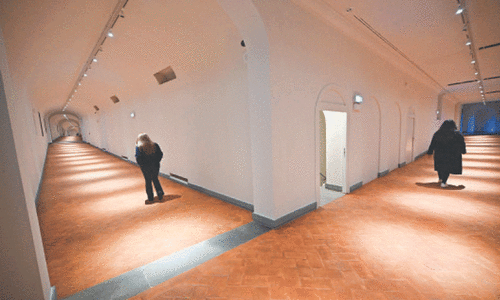OMANTHAI (Sri Lanka): The guards at the checkpoint into Tamil rebel-held territory in northern Sri Lanka do not ask to see your passport, but they might just as well. It is here that Tamil Eelam, the homeland that rebels have fought for decades and so bloodily, is taking reality.
The situation on the ground that the Liberation Tigers of Tamil Eelam (LTTE) say they want to discuss with Norwegian peace broker Erik Solheim on Wednesday are here for all to see.
The sprawling zone already has all the trappings of an international border where papers are shown, identities checked, luggage searched and goods transhipped.
A military policewoman smiles knowingly when asked if she would like to see passports.
The very idea of a border separating part of the island from another is anathema to Sinhalese among Sri Lanka’s majority community who see Omanthai as a betrayal of sovereignty and violation of national security.
With real efforts under way to launch fresh peace negotiations, the thorny border issue is one of a series of major obstacles in the way of a final peace agreement.
The crossing point — the frontline after years of heavy fighting — first came out of the 2002 ceasefire negotiated by a previous government. It lists details such as a 500-metre (yard) divide, an open road and a no man’s land.
“Some 2,000 vehicles and 3,000 passengers pass through Omanthai daily,” a Sri Lankan military police officer says, asking not to be named.
VIPs, diplomats and employees of non-governmental organisations enjoy a fast track through the maze of tin shacks and some more permanent structures which are sprouting. Ordinary citizens languish for hours under the sun.
The International Committee of the Red Cross has a manned station on both sides of the divide to deal with human rights cases.
A few hundred yards down the rough tarmac track and you are in what appears to be another country and the clock goes back half an hour.
The arrival process also follows the departure formalities.
“We call it Tamil Land,” says official translator Thayarajah Singham. “Welcome”.
Registration with the LTTE authorities takes you back and forth among lines of neat and tidy thatched roof huts. Everyone is pleasant and eager to know when peace is finally coming.
Signs of statehood are everywhere, as are photographs of the renowned LTTE supremeo Velupillai Prabhakaran.
But no passports, please.
At least some of the niceties of diplomacy are being observed — the LTTE has not declared its own state and the new Colombo government, with little choice, accepts the situation.
As you wave goodbye to the “immigration” officials, LTTE police in full local uniform appear on the road guiding crowds across the road.
At Kilinochichi, the first big Tamil town on the road north, Tamil Eelam offices are everywhere, run by the LTTE as if in its capital city.
Nonetheless, the Sri Lankan government still supplies all the infrastructure, such as it is, in Tamil Land. From water to roads, electricity to education, Colombo provides and pays the local salaries.
“We have a de facto state,” LTTE media coordinator Daya Master tells AFP at his well-equipped offices. “Seventy per cent of the north-east area is LTTE-administered. We have our police, judiciary and finance sectors.—AFP














































Dear visitor, the comments section is undergoing an overhaul and will return soon.